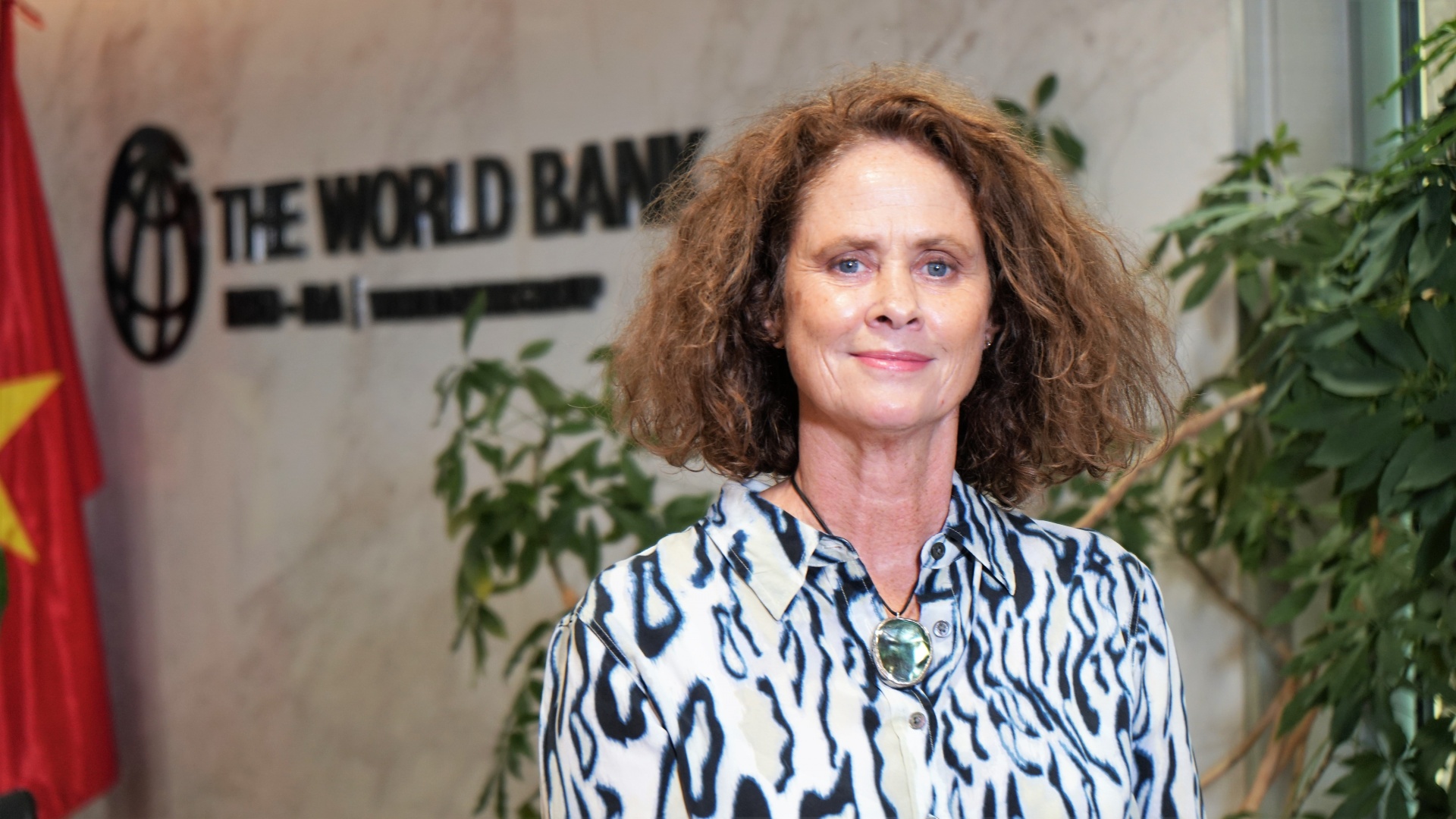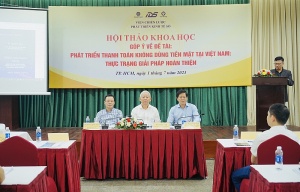Opportunities and challenges for Vietnam in financial sector reform
 |
| Carolyn Turk, country director for the World Bank in Vietnam |
Recent bank failures in the US and Europe serve as a wake-up call to financial sector authorities around the world to strengthen regulation and supervision of financial institutions.
The recent episode of domestic financial market trouble underscores the same need in Vietnam. While the authorities have managed to control the situation, the measures have so far been focused on merely containing the problems.
More structural reforms in the financial sector will be necessary to improve its long-term resilience. Vietnam's aspiration to become a high-income country requires a well-developed and stable financial industry that supports the private and public sectors.
The review of the Law on Credit Institutions (LCI) and the Law on the State Bank of Vietnam (LSBV) is an excellent opportunity to kickstart these structural reforms.
The LCI and LSBV are the foundational documents that enable the State Bank of Vietnam (SBV) to regulate and supervise credit institutions and respond effectively to financial crises.
The last amendment of the LCI was in 2017, but the core of both the LCI and LSBV was established in 2010. Since then, there have been many developments in the banking sector, internationally and domestically.
The experience of past crises illustrate the need to strengthen these laws, incorporating more modern approaches and international standards.
The World Bank has reviewed the draft of the LCI and has found encouraging developments in the inclusion of non-performing loans (NPLs), removing restrictions limiting the use of expedited procedures, and corrective actions to remove procedural impediments.
| The experience of past crises illustrate the need to strengthen these laws, incorporating more modern approaches and international standards. |
In addition, there is room to upgrade the legal framework and align it to minimum international standards.
The revision should aim for consistency between the LCI and LSBV, introduce provisions for a risk-based supervisory regime, provide legal protection for supervisors, and establish a more effective intervention strategy for failing banks.
At present, there are several inconsistencies between the LCI and LSBV. This is particularly true for the SBV's statutory objectives regarding financial institution regulation and supervision, its legal powers, and legal protection for supervisors.
The authorities should initiate a review of the LSBV at the earliest opportunity to ensure appropriate compatibility and consistency between the two laws. The current revision of the LCI, and the proposed revision of the LSBV next year, provide an excellent opportunity to align more closely with international minimum standards and good practices.
The most relevant international standards are the 'Core Principles for Effective Banking Supervision', issued by the Basel Committee on Banking Supervision, and the 'Key Attributes of Effective Resolution Regimes for Financial Institutions', issued by the Financial Stability Board.
The ongoing global financial crisis has demonstrated that robust laws, policies, and procedures, and the associated financial safety nets, are essential in any financial system. All countries, regardless of size, need to have effective recovery and resolution regimes for banks and other financial institutions.
Failures of financial institutions will inevitably occur from time to time. When they do, it is important to ensure that the failure be resolved quickly and cost-effectively, with a minimum of government-funded assistance. Such failures should be managed in ways that maintain the continuity of systemically important financial systems, while also ensuring that shareholders and large creditors bear their fair share of losses.
It is equally important to ensure that the senior management of any failed institution bears the consequences of any culpability in that failure.
A fundamental requirement of financial sector regulation is for the supervisory authority to have a strong degree of operational independence. This recognises that decisions need to be made impartially, in a neutral manner, and consistent with statutory objectives. Inappropriate political interference or involvement creates a risk that regulatory and supervisory decisions will not be made in accordance with these principles. Therefore, the law needs to confer a strong degree of operational independence on the supervisory authority.
Also, given the nature of the supervisory actions and powers vested in the SBV, it is essential that there be a strong degree of legal protection for the SBV itself, as a lack of protection can create the risk of delayed or poor-quality decision-making, or even worse, inaction.
The upgrade of the legal and regulatory framework of Vietnam's financial sector is an opportunity to enhance the banking sector's ability to finance Vietnam's growth. It will increase market confidence and entice investors with long-term interests in the country's banks, bringing a healthy competition to the sector.
For the past five years, the World Bank has been providing technical assistance to the SBV as part of the Vietnam Banking Sector Soundness Development scheme, supported by a trust fund provided by the Swiss State Secretariat for Economic Affairs.
The initiative aims to enhance the capacity of the SBV to implement reforms aligned with international standards and good practice and has four main aims. These are to improve the legal and regulatory framework; strengthen supervision capacity; upgrade the management of underperforming assets and weak banks; and enhance financial stability and macro-prudential oversight.
 | Vietnam faces more challenges to attract FDI Vietnam is facing more challenges to attract more foreign direct investment (FDI) as traditional sources of overseas capital are looking for opportunities closer to home. |
 | Building a team to make most of funding in Vietnam Vietnam witnessed slow foreign investments in Q1. Matthew Lourey, managing partner of professional corporate services company Acclime, shared his insight to VIR’s Hong Nhung about the inflow of this kind of funding into the country in the months to come. |
 | Tough times for building materials sector The construction materials industry has seen revenue drop by $1 billion over the last two years and is valued at approximately $2 billion annually at present, far below its pre-pandemic figures. This observation came from Dinh Quang Huy, chairman of Vietnam Building Ceramics Association at a seminar held on June 10 in Hanoi seeking measures to help building materials firms out of their current difficulties. |
 | Vietnam grapples with challenges in cashless payments The evolution of cashless payments in Vietnam came under the spotlight at a recent conference convened by the Institute for Digital Economy Strategy (IDS) in Ho Chi Minh City. The seminar aimed to analyse the existing legislative landscape, identify barriers to advancement, and propose potential regulatory enhancements to bolster cashless transactions. |
What the stars mean:
★ Poor ★ ★ Promising ★★★ Good ★★★★ Very good ★★★★★ Exceptional
Related Contents
Latest News
More News
- Cashless payments hit 28 times GDP in 2025 (February 04, 2026 | 18:09)
- SSIAM and DBJ launch Japan Vietnam Capital Fund (February 04, 2026 | 15:57)
- Banks target stronger profits, credit growth in 2026 (February 04, 2026 | 15:43)
- Vietnam on path to investment-grade rating (February 03, 2026 | 13:07)
- Consumer finance sector posts sharp profit growth (February 03, 2026 | 13:05)
- Insurance market building the next chapter of protection (February 02, 2026 | 11:16)
- NAB Innovation Centre underscores Vietnam’s appeal for tech investment (January 30, 2026 | 11:16)
- Vietnam strengthens public debt management with World Bank and IMF (January 30, 2026 | 11:00)
- Corporate bond market poised for stronger growth cycle (January 28, 2026 | 17:13)
- Vietnam's IPO market on recovery trajectory (January 28, 2026 | 17:04)

 Tag:
Tag:


























 Mobile Version
Mobile Version